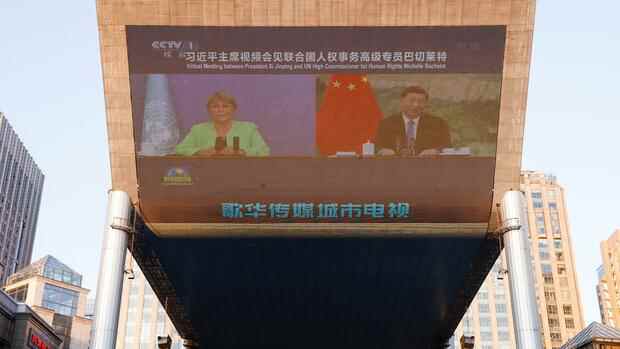Beijing It was a highly controversial trip that the UN High Commissioner for Human Rights, Michelle Bachelet, concluded with a virtual press conference on Saturday after six days. As the first UN High Commissioner for Human Rights since 2005, she traveled to China for a total of six days.
In addition to talks with China’s state and party leader Xi Jinping and Foreign Minister Wang Yi, the focus of her visit was a trip to the western Chinese province of Xinjiang, where the Chinese leadership is accused of serious human rights abuses against the Muslim Uyghur minority.
But instead of describing what she learned during her visit and the conversations, Bachelet remained vague during her statement. She dodged subsequent questions from journalists about the conditions of her trip.
The Chinese government has vehemently rejected reports of massive human rights abuses in the province, calling them lies. Representatives of the Ministry of Foreign Affairs and Chinese state media paint a picture of a harmonious society in Xinjiang, in which the Muslim minority is allowed to practice their faith. She describes arrests and the extreme surveillance of the people living there as anti-terrorist measures.
Top jobs of the day
Find the best jobs now and
be notified by email.
The province is now akin to a police state, whose residents are closely monitored around the clock, and where it is enough to go to the gym or wear a beard to be imprisoned for years on the pretext of preventing extremism. The Chinese government calls the detention centers “training centers”, human rights organizations speak of re-education camps.
Bachelet said on Saturday evening that she was not in a position to assess the full extent of the “training centers”. But she warned the government of “the lack of independent judicial oversight of the operation of the program” and the fact that “law enforcement agencies rely on 15 indicators to identify trends in violent extremism.”
She also addressed the allegations of violence and abuse in the facilities and reports of unreasonably strict restrictions on legitimate religious practices, Bachelet said. She called on the government to review all counter-terrorism and de-radicalization measures to ensure they are in line with international human rights standards and, in particular, are not applied in an arbitrary and discriminatory manner.
Criticism of the UN’s silence
For years, numerous documents and eyewitness reports have shown that the authorities massively intimidate the population in the region and especially the Uyghurs. “Anyone you set up a conversation with is putting themselves at very high risk,” says Philip Alston, a professor of human rights at New York University School of Law and former UN Special Rapporteur on extreme poverty and human rights. Experts like Alston doubt that independent talks with those affected are even possible under these circumstances.
>>Listen also: VW-Boss Herbert Diess on the responsibility of the economy
For years, journalists have been shadowed when doing research in the region and have been massively prevented from working. According to the New York Times, Chinese government officials have threatened Uyghurs abroad who asked Ms. Bachelet to gather information about her relatives.
Only on Tuesday did an international media consortium report on new documents and photos that again prove the serious violations of human rights against the Muslim Uyghur minority in Xinjiang. As a result, there was a lot of international criticism. The federal government also distanced itself from China. Federal Economics Minister Robert Habeck said on Tuesday that human rights would have greater weight under the new government. Germany will reduce its dependency on China. “The protection of human rights has a higher weight.”
The UN High Commissioner for Human Rights did not directly criticize the Chinese government during the press conference on Saturday. And even when journalists explicitly asked what conditions she found during the visit and whether the people she met had been put under pressure, she only answered evasively. “We closely monitored any pressure or intimidation during my visit,” Bachelet said. And she will continue to watch it.
Why the visit was still important
Even if Bachelet’s trip to Xinjiang was not an investigation in itself, as the UN High Commissioner herself repeatedly emphasizes, human rights expert Alston believes that the visit was “extremely important” – because it drew international attention to human rights abuses in Xinjiang have steered. “Now to get the issue back on the front pages, confronting the sitting heads of state, the sitting foreign ministers makes a really big difference,” says Alston.
Observers are now eagerly awaiting what Bachelet will write in her report on the human rights situation in Xinjiang. He is expected in the coming weeks or months.
More: These German companies are active in Xinjiang.
